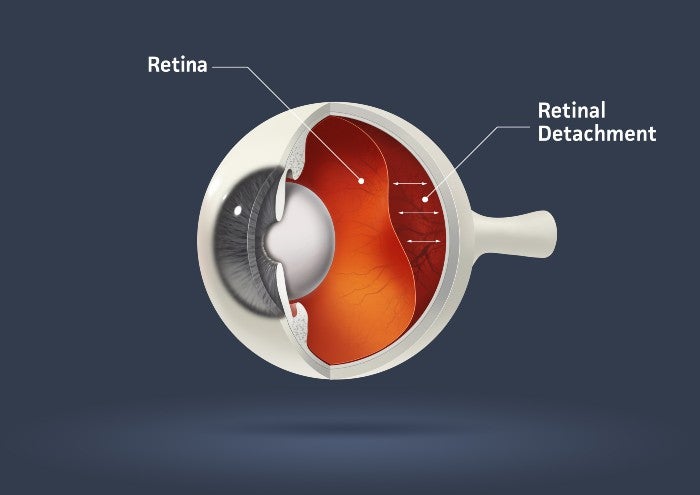Retinal Detachment Symptoms & Treatment in Derry, NH & Nearby Areas
Retinal detachment symptoms indicate a medical emergency that calls for prompt intervention. That’s why Spindel Eye Associates provides responsive support to help patients in Derry, NH, & surrounding areas achieve advanced retinal detachment treatment. Look to us for compassionate care and experience guidance to preserve your vision.
What Is Retinal Detachment?
Retinal detachment is an eye condition that impairs the function of the retina. The retina is a layer of light-sensitive tissue in the back of the eye. With retinal detachment, this area becomes compromised, causing it to move from its intended position, leading to discomfort, changes in vision, and other unfavorable symptoms.

Retinal Detachment Symptoms
Minor cases of retinal detachment may not offer any symptoms. However, in more severe cases, signs of retinal detachment may include:
- Blurry or cloudy vision
- Dark spots or small lines impairing your vision
- Light flashes in one or both eyes
- Dark shadows in the middle or the outer corners of your vision
What Causes Retinal Detachment?
There are three forms of retinal detachment: rhegmatogenous, tractional, and exudative. Each type of retinal detachment is linked to a specific issue that causes the retina to become detached. The most common causes of retinal detachment include:
- Aging
- Eye trauma or injury
- Changes in the vitreous
- Underlying eye conditions
Am I at Risk for Retinal Detachment?
Retinal detachment can happen to men and women at any age. However, certain factors put some individuals at a higher risk of experiencing retinal detachment, including:
- Family history of retinal detachment
- Trauma eye injuries
- History of eye surgery
- Diabetic retinopathy
- Severe or degenerative myopia
- Posterior vitreous detachment
- Eye disease, including lattice degeneration and retinoschisis
Preventing Retinal Detachment
It can be challenging to prevent retinal detachment due to aging. However, to mitigate retinal detachment caused by injury, you may opt for protective eyewear or safety goggles when engaging in sports or high-risk activities. Furthermore, it’s essential to schedule regular dilated eye exams to catch minor retinal tears and detachments in the early stages.
Diagnosing Retinal Detachment
Spindel Eye Associates uses dilated eye examinations to diagnose retinal detachment. This involves eye drops to widen the pupil, allowing us to observe the back of the eye and retina. We may also apply pressure to the eyelids to detect retinal tears. If bleeding has occurred, we may recommend an optical coherence tomography or eye ultrasound.
Retinal Detachment Treatment
Retinal detachment treatment varies depending on the type of retinal detachment and the severity of the condition. Surgery is required for the majority of patients with retinal detachment. In cases where the retina is not yet detached but is torn, photocoagulation or cryopexy treatments may be used to preserve the patient’s vision and mitigate further detachment.
Retinal Detachment Surgery
Retinal detachment is a medical emergency requiring immediate intervention. To repair retinal detachment, Spindel Eye Associates may use various surgical procedures, including:
- Pneumatic Retinopexy – Air or gas injections to force the retina against the eye wall.
- Scleral Buckling – Indenting the eye’s surface to shield the impacted area and relieve pressure.
- Vitrectomy – Draining and replacing eye fluid.
Retinal Tears
Photocoagulation and cryopexy are methods used to treat retinal tears. Photocoagulation is a laser surgery that creates burns surrounding the retinal tear, causing scarring that welds the retina to the connective tissue. Cryopexy is a treatment that involves using a local anesthetic to freeze the eye and create a scar to weld the retina to the eye wall.
Coping & Support
Retinal detachment can result in vision impairment or loss. To cope with these changes, we recommend the following strategies:
- Opt for glasses.
- Illuminate your home.
- Eliminate fall risks, such as rugs.
- Install motion-sensor lighting.
- Ask loved ones for assistance.
- Swap out books for audiobooks.
- Use transportation resources for individuals with impaired vision.
- Find community amongst others with impaired vision.
Contact Us for Retinal Detachment Treatment
If you are experiencing retinal detachment symptoms, don’t hesitate to pursue prompt treatment with Spindel Eye Associates. As the leading retinal detachment specialists in Derry, NH, and surrounding areas, look to us for comprehensive care and compassionate guidance to preserve your vision. Contact us to schedule an appointment today.
